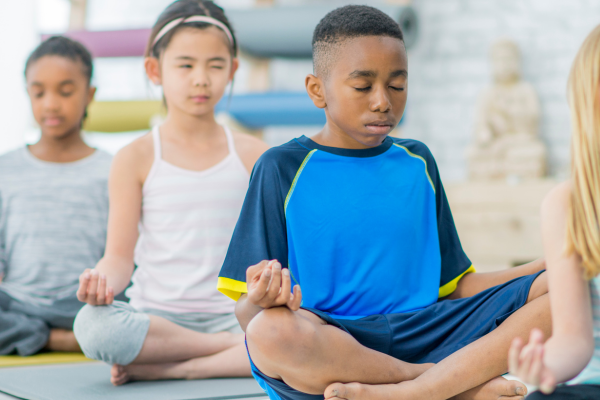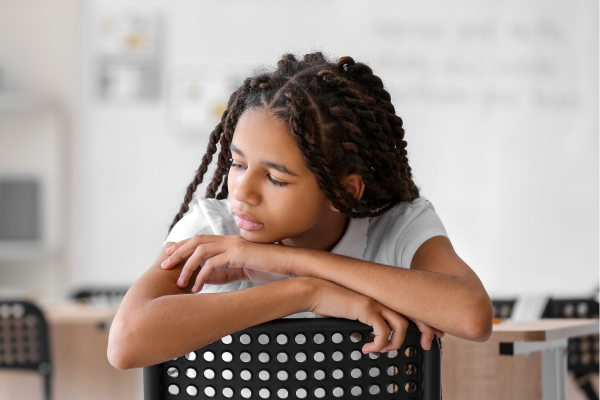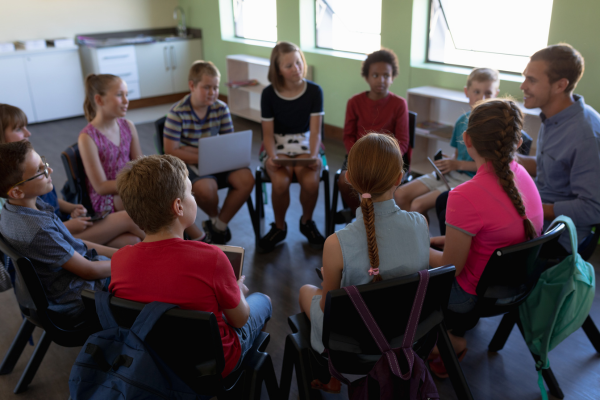By: Darien Waters
Highlights:
- This Research in Brief blog is part of the School Mental Health series highlighting work and resources for mental health professionals.
- This brief originated from the Virginia Partnership for School Mental Health (VPSMH) project, which partners with VA school divisions and institutions of higher education to expand support for school mental health services.
- This brief summarizes a research article exploring mindfulness based cognitive behavioral therapy (MCBT) as an evidence-based practice to help adolescents develop positive coping skills, specifically as it relates to managing anger and aggressive behavior.

This article explores mindfulness based cognitive behavioral therapy (MCBT) as an evidence-based practice to help adolescents develop positive coping skills, specifically as it relates to managing anger and aggressive behavior. Both mindfulness and cognitive- behavioral therapy (CBT) aim to proactively influence areas of the brain responsible for impulse control, decision-making, and planning. While CBT is focused on restructuring thoughts, MCBT emphasizes identifying negative thought patterns and addressing their underlying processes. The end goal of MCBT is to decrease impulsive and reactive behaviors.
Importance
- Middle school youth are entering a key stage of brain development, therefore it is a critical time for students to learn and use emotion regulation skills.
- Students who have difficulty regulating their emotions can experience negative outcomes both inside and outside of school.
- School mental health professionals play a major role in helping students develop the necessary coping skills to prepare them for future success.
- MCBT is a long-term technique, therefore, it may not be appropriate for students who would be better suited to a short-term approach.
Equity Considerations
- Both mindfulness and CBT have extensive research documenting benefits to individuals’ mental and emotional health.
- School mental health professionals must take care to consider the cultural responsiveness of MCBT before incorporating it into counseling sessions with a particular student.
Practitioner Tips
- Consider using the Firework model as a method of explaining the connection between a stimulating event and the potential outcomes in the absence of proper regulation.
- School mental health professionals should emphasize the mind / body connection as a key component of managing aggressive feelings and behaviors.
- After introducing the concept of MCBT, school mental health professionals should identify facets of the practice that best fit the student and reinforce those concepts in future sessions.
Reference
Clark, L.B. (2020). Utilizing mindfulness- based CBT to address anger and aggression in middle schools. Journal of Child and Adolescent Counseling, 6(2), 97-109. https://doi.org/10.1080/23727810.2020.17 19351
If you have any comments or questions about this post, please email Youth-Nex@virginia.edu. Please visit the Youth-Nex Homepage for up to date information about the work happening at the center.
Author Bio: Darien Waters is a graduate student in the Counselor Education program at the University of Virginia, pursuing the School Mental Health emphasis offered to trainees through the Virginia Partnership for School Mental Health. Trainees in this emphasis complete additional coursework and field experience requirements that prepare them to take on leadership roles in addressing the mental health needs of students in K-12 schools.






